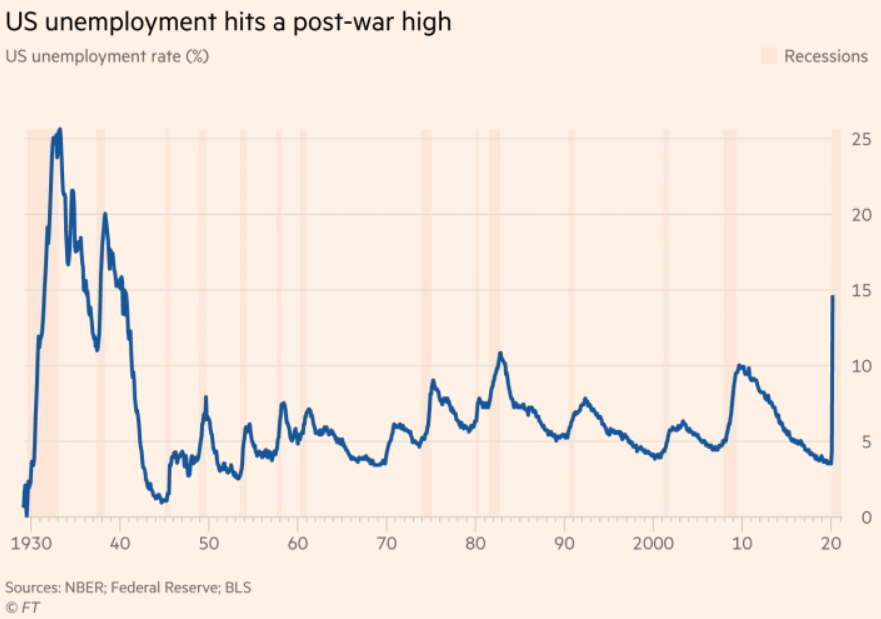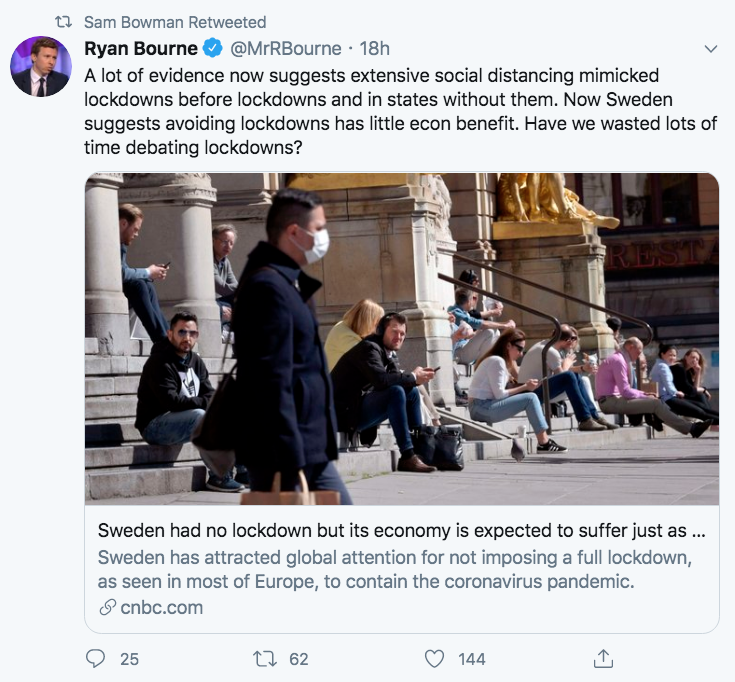
Back on April 14 I made this claim:
Another common mistake is to conflate “opposition to extreme social distancing” with “libertarianism”. If America today were a 100% free market economy with no regulation, we would still be in a deep depression due to people freely choosing to isolate themselves.
Now the Twittersphere is catching up to this reality:

I wouldn’t say “we” have wasted a lot of time; I’d say “you guys on twitter” have wasted a lot of time. Lockdowns are worth debating, but not under the assumption that the lockdowns are causing the depression.
HT: Sam Bowman

READER COMMENTS
Ray
May 8 2020 at 3:29pm
The cumulative effects of hysteria fueled by bad viral models and incomplete facts leading to lock downs are the primary causes for the economic catastrophe.
Extricating ourselves will require either courageous leaders willing to take risks on messaging.
Lifting the lock downs will also absolutely help. A segment of the population is unafraid and can help inspire confidence in those still cowering.
Unfortunately, the media will combat this.
The Twitter folks combatting the fear are doing yeoman’s work and should be applauded.
Scott Sumner
May 8 2020 at 6:14pm
Ray, You said:
“Extricating ourselves will require either courageous leaders willing to take risks on messaging.”
Modern democracies don’t have “leaders”, they have followers. If we depend on our “leaders” then there is no hope at all.
John Alcorn
May 8 2020 at 7:10pm
My reply to Ryan Bourne’s question is: No, the debate about lockdown is necessary because voluntary social distancing and private adaptations to the pandemic by individuals and firms (a) involve much less coercion than does lockdown, and (b) spare polities thorny issues, contention, and even strife around how and when to exit from lockdown.
(Aren’t liberty and spontaneous order primary issues at Cato?)
Moreover, it’s fair to say that Sweden’s economic distress wouldn’t be as deep as distress in lockdown countries, if not for the fact that little Sweden’s economy has also been swamped by massive contraction in trade and by disruption of international supply chains.
Scott Sumner
May 8 2020 at 11:33pm
Yes, but even without lockdowns the US would be in a very deep depression right now. Much of the debate was premised on the mistaken idea that it was a choice between no lockdown and a deep depression. That choice never existed.
John Alcorn
May 9 2020 at 10:14am
Wasn’t there a choice between (a) a recession this deep with lockdown and (b) a recession less deep than this, with much less coercion than lockdown, and with prompter economic adjustment (shift of resources) to new realities?
Wouldn’t the USA’s economy have been less swamped than Sweden’s by global economic disruption? Sweden’s relatively small economy seems particularly exposed to disruption in international trade and to global economic contraction.
On the economic dimension, I don’t pretend to estimate the magnitudes of ‘less deep recession,’ or ‘prompter economic adjustment,’ etc. No doubt, it’s a matter of degrees of awful. But isn’t the sign correct? And might these magnitudes be substantial?
On the coercion side, I hasten to acknowledge that, without lockdown, a fraction of employees would have been exposed to exploitation by a subset of unscrupulous employers of managers, who would pressure employees to work in unduly risky environments. Presumably, mass unemployment would have weakened employees’ bargaining power. Again, I don’t pretend to estimate the magnitude of increase in exploitation without lockdown in a free-falling economy. But, again, the mechanism and sign are correct. Thus there is a trade-off between government coercion and employer exploitation; the pandemic is tragic.
A methodological point about counterfactual speculation about pandemic policies: Maybe the policies are mostly endogenous. Swedes will defer to public-health guidance. Americans will fight over every move. South Koreans will mobilize. But my hunch is that sometimes there are quirky turning points, where individuals or ‘accidents’ shape “the debate,” and the debate matters. The Imperial College report, which neglected voluntary social distancing in its dire predictions, and which prompted Boris Johnson to switch to lockdown, seems a case in point. Perhaps the idiosyncratic early spate of infection among UK government elites also played a role in policy-formation.
Scott Sumner
May 9 2020 at 2:24pm
Yes, I agree that we’d probably be better off without lockdowns, partly because we’d then have focused more attention on solutions that are more effective, such as what you see in East Asia. I don’t view Sweden as a useful model; South Korea and Taiwan did much better.
John Alcorn
May 9 2020 at 6:39pm
Let’s grant, for sake of argument, that the USA might choose to emulate another country’s pandemic policy. The key is to avoid falling between two stools. Which country should the USA emulate?
It might be the case that Taiwan (or South Korea) is the best model at the outset of a pandemic, but not after a pandemic becomes entrenched, so to speak. At this stage in the USA, Sweden (private adaptation), plus a more determined commitment to shield vulnerable demographics, might be a more accessible model.
Back to reality, the USA will do its own things.
Mark Z
May 9 2020 at 12:56am
As you mention in your other post, testing, social distancing, and masks are three big policies (or behaviors) that collectively mitigate the epidemic. To the extent that social distancing is inevitable (and even if it weren’t, but for different reasons), that puts more emphasis on masks and testing, which mitigate the tradeoff between reducing viral spread and increasing economic activity. If you don’t need to convince people to social distance (and can’t convince them not to), then the focus in public policy should be on providing them with ways to safely do less of it. That may be the right debate. And since there aren’t many alternatives to masks and testing at the moment, and it seems inconceivable that it’s not worth it at the margin to do more of both, the only debate on that front really is ‘how.’
Scott Sumner
May 9 2020 at 2:25pm
I agree.
Thomas Hutcheson
May 9 2020 at 12:08pm
Two different issues. 1) How much do legal regulations on social distancing, etc. contribute to the supply shock and how can these be optimized? 2) How much of the fall in real income is due to the supply shock and how much to the Fed failing to maintain NGDP growth at 4-5% or even PCE inflation expectations at 2%.
I’d be interested in Scott’s guess or suggestion about how to estimate or think about 2)
Scott Sumner
May 9 2020 at 2:26pm
I don’t believe the Fed has much to do with the current state of the economy, but over time our problems will likely be increasingly due to overly tight money.
John Alcorn
May 12 2020 at 10:48am
Nils Karlson, Charlotta Stern, and Daniel B. Klein (Ratio Institute, Sweden) make a case that it’s the right debate. See their short essay, “Sweden’s Coronavirus Strategy Will Soon Be the World’s” (Foreign Affairs, 12 May 2020).
Comments are closed.